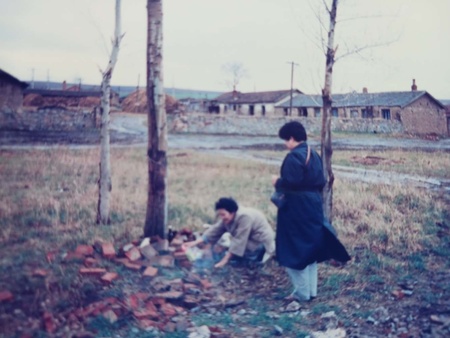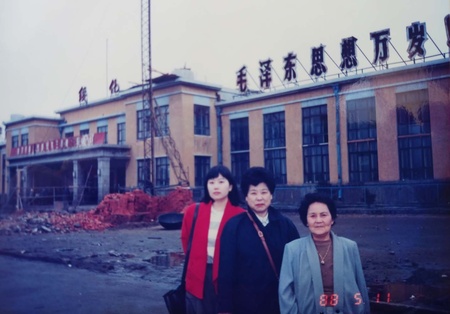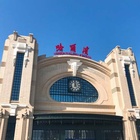Following in my grandfather's footsteps
More than 40 years have passed since my mother and grandmother left Manchuria, and in 1988, 34 years ago, I put into action a plan I had been thinking about for a long time. It was to visit the former Manchuria with my mother, grandmother, and myself. At that time, I was working at a publishing company in Tokyo. I had seen the film "The Last Emperor" directed by Bernardo Bertolucci, which depicts the life of Puyi, the puppet emperor of Manchuria, and I was able to concretely paint a picture of Manchuria that I had heard about from my mother since I was a child.
My grandmother Kayo was 70 years old at the time. It seemed like this was the only chance for her and my mother to visit the place where my grandfather died as a prisoner of war after parting ways at the Suica Station. However, before the Tiananmen Square incident, free travel was not yet permitted in China. I remember that the cost was quite high because it was necessary to be accompanied by a professional guide sent by the Chinese government, but if we had waited for liberalization, we might have missed my grandmother's chance. We had no choice but to go while she still had the energy and strength.
I asked a Chinese government travel agency to create an itinerary for a one-week tour of Beijing, Harbin, and Mudanjiang, and set off for China with my mother and grandmother, who had come to Tokyo from Oita during the Golden Week holidays in 1988. Mudanjiang was the city where the Soviet military prison camp where my grandfather died was located. Harbin was a stopover on the way to Mudanjiang.
To my mother's hometown, Suika
At Beijing Airport, a young woman who looked to be in her 20s came to greet us with a sedan. She was a professional interpreter guide in Beijing. My grandmother handed the guide, whose name I can no longer remember, some souvenir accessories and stockings and said, "Thank you for your help." The next day, I was surprised to see that the car that greeted us at the hotel had changed from an ordinary sedan to a black luxury car. I felt like I was reminded that my grandmother had not forgotten the way of life she had experienced in Manchuria, where she lived several decades ago. After touring tourist attractions such as the Forbidden Palace and the Temple of Heaven, we flew to the next city, Harbin.
Our guide in Harbin was memorable. He was a man in his 40s and very kind. After we had looked around the city, he invited us to chat a little in the hotel room. When he noticed the Japanese magazine I had brought with me, he asked if he could read it. It was probably difficult to get hold of foreign language magazines at the time. What's more, the cover of the magazine happened to be a photo of Hu Jintao, the top leader of China at the time. When I said to him, "Please, I've already read it, so please take it home," he carefully carried it home, tucking it inside his coat so that no one would notice that he was holding it. I was impressed by that.
The next day, our guide had arranged for us to go a little further from Harbin, but my mother suddenly said, "I want to visit Suika, the city where our family last lived." The night before, our guide had asked why we were traveling in China, and he quickly changed our plans, saying, "It's close enough that we could do it in a day. Okay, let's go." Thinking back, it's highly likely that he should have notified his superiors of the change in plans made by foreign tourists, but he accepted our request without consulting anyone.
So we drove to Suika, where my mother's family lived until the end of the war. I remember it took about four hours each way. Moreover, from the car window, all we could see was a monotonous view of fields and rows of trees stretching to the horizon. When we arrived, Suika looked like a boring rural town to me. The roads were barely paved, and the ground was muddy. Where on earth had the modern cityscape my mother had told me about disappeared to? All I remember is the simple smile of a child. We couldn't find the house where my mother and her family lived, but my mother and grandmother still thanked the guide many times. They must have been happy that he had changed his plans to show them my mother's hometown.
Grandmother's Prayer
After leaving Harbin, we headed to Mudanjiang, where my grandfather Susumu spent his final days. Another male guide greeted us at the Mudanjiang airport. After explaining about my grandfather, he called over another man and together they guided us to a place that was said to be the site of a Soviet military prison camp. Of course, we don't know where my grandfather is buried. My grandmother offered sake and pickled plums to the pine tree that stood there, which she considered to be a grave. It was the first memorial service in over 40 years.

After the war, my grandmother brought my mother, her younger brother and sister back to Japan from Manchuria, and while working on unfamiliar farming at her late husband's family home, she looked after my father-in-law (my great-grandfather). She never remarried. Perhaps she reported to Buddha about my grandfather's decades of hardships at the place where he died. However, I imagine that my grandmother, who was a positive thinker, simply prayed for my grandfather's soul to rest in peace. There is no way to confirm this with my grandmother, who passed away in 2008.
Four years after retracing my grandfather's footsteps with my mother and grandmother, I quit my job at a publishing company in Tokyo and moved to Los Angeles on my own. I went to the United States with the belief that crossing the ocean would open up a new future for me. I wonder if my grandfather, Susumu Kono, had the same feelings as me when he set out in search of a new world in Manchuria nearly 70 years earlier.
© 2022 Keiko Fukuda







